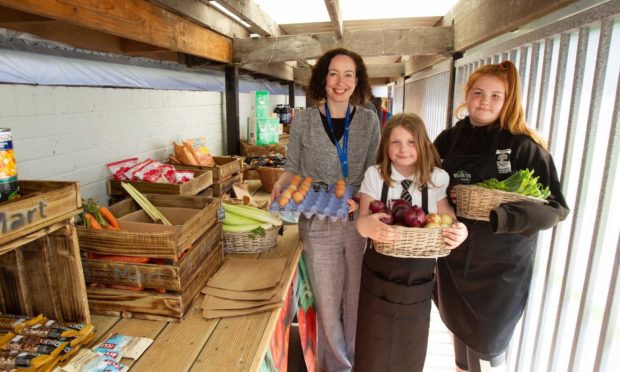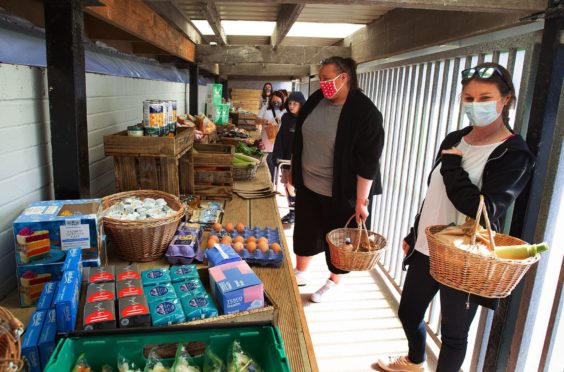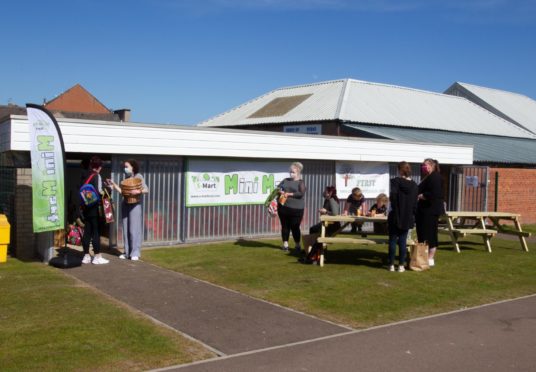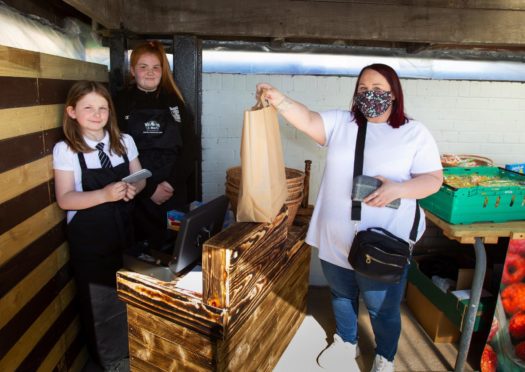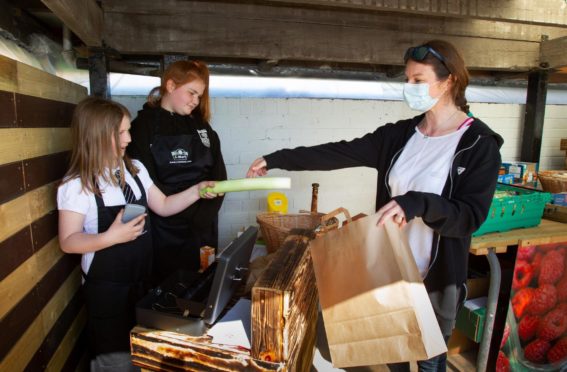A new social enterprise offering affordable food and saving items from going to waste is being run by children at an Angus primary school.
Supermarkets in Arbroath had better watch their backs as there is a new competitor in town.
Ladyloan Primary School has launched its own mini-mart which not only provides cheaper goods for sale, but will help to reduce food waste and help with food insecurity.
Working in partnership with the successful S-Mart social supermarket in Forfar, run by Community First UK, it is hoped the project, to be run by pupils at the school, will be the first of many.
Pauline Lockhart, founder of Community First UK, which has provided 36,000 meals across Angus during the coronavirus pandemic, hopes that the Ladyloan venture will be the first of many throughout the county.
She said: “Carol (Malone) and I started off with the packs and stuff, but we had spoken about getting an S-Mart in every town in Angus, but the work it has taken to get the actual shop in Forfar running was huge.
“A lot of schools have their own foodbanks so we came up with the idea of imagining how wonderful it would be if the S-Mart was in a school. The learning opportunities rather than anything else for the kids would be great, but also access to affordable food for the parents was the key thing.
“One thing led to another and we were put in touch with Susan (Ross), acting principal teacher at Ladyloan, and head teacher, Jill (Davie), who were so enthusiastic.
“They came to visit the shop which makes a huge impact on people when they actually see it.”
Transformed
After seeing S-Mart’s set-up, the teachers were determined to set something up at Ladyloan and set about converting an old bike shed that has been transformed into their own mini-market.
Pauline continued: “They totally understood what our ethos is – all about making food affordable for people, especially with everything that has been going on.”
Carol added: “And reducing food waste, sometimes it feels like if you are doing something good for your community or for the environment there is a cost associated with that, so it’s easy when you have money to be environmentally friendly because there’s a greater cost.
“What we are trying to do make it that everybody that shops with us is helping the environment.”
Pauline said: “That is exactly what it is as the food that we use is surplus stock. We have a relationship with FareShare, from where we get items from and there was a glut last summer from apple trees, pear trees and people growing things in their garden.
“They were delighted to know that there is somewhere the produce would go and is doing good. There is a really good community buy-in into what we are trying to do.”
Food in phone box
After the initial contact, things began to move quickly on a successor to a previous food initiative the school was running – leaving items in a telephone box.
And joining together on the mini-mart project is now helping to remove the stigma from people who perhaps need a helping hand.
“Ladyloan were putting their surplus goods in a telephone box around the corner. People were going at nights because they were embarrassed and what they wanted to do, like us, was make it accessible and take away any stigma from people,” Pauline revealed.
“The underlying thing from all of us is that we want people to access affordable food in a dignified manner, so when people go to foodbanks they have a big process they have to go through and that proved people wanted to access the food but there were barriers there.
“Now, we are providing that access through the discounted goods and surplus goods. People can come in and it is just a regular shop, open to everyone and there is no stigma.
“Whatever the reasons whether they want to help the environment or are on a tight budget, it is there for them.”
Life skills
Another positive is the education of the pupils involved in the project benefiting greatly as they learn life skills that will help them in the future.
“From an educational point of view it’s incredible, some of the things they will learn,” Pauline added.
“Every school has an enterprise programme and this will feed into that as well. With us being a social enterprise as well, we can come in and help teach the kids what that is.
“This is just the start of the relationship and we are dead excited about what the potential is, not only for Ladyloan but for other schools which we will hope will see what the benefits are and want to get involved.”
Just like a supermarket
So, what can you buy at Ladyloan’s mini-market and how does it operate?
The concept is simple. You pick up your mini basket and wander through, picking up what you need before paying for your goods at the end – as you would do in any supermarket.
“As well as ambient products, like tins and stuff, there is fruit and veg. The schools themselves have a relationship with the supermarkets too and they will pick up goods that are probably use by that day or the best before,” said Carol.
“This also helps to educate the kids on the difference between a use-by date and a best before.
“We will be supporting them with food and any money they make will go back into the school, so it is good for their finances as well.
“We aim for the goods to be 50% cheaper than they would be in a supermarket which makes things much more affordable. It also gives people an opportunity to maybe try new things without the burden of cost hanging over them.”
Learning experience
Susan Ross, acting principal teacher at Ladyloan, is excited by the opportunities the partnership project provides.
“We wanted to get involved with S-Mart really to tackle the key issues of food waste, shopping locally and food insecurity, but also let the children have a good learning experience, too, as it gives them the skills for future employment and those good attitudes towards employability as well,” she said.
“The kids have worked really hard to get things up to scratch and to display the products, and to price the products. We have also worked with the Arbroath Men’s Shed and East Seaton Farm as well to prepare the building.
“We want it to a sustainable project so we can use the funds to go back into school to fund projects, but also to fund community engagement as well.
“Everyone can use it – parents, staff in school, members of the local community it’s doors open to everybody.”
